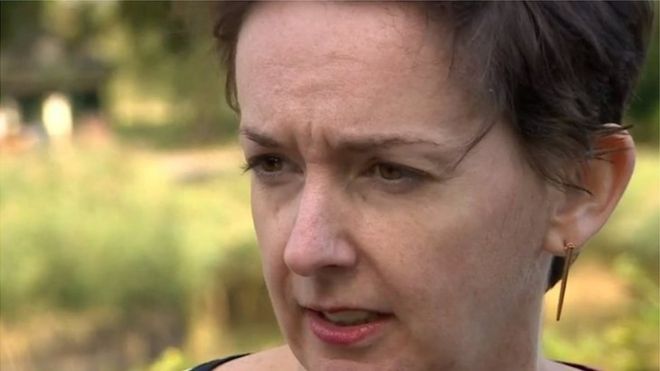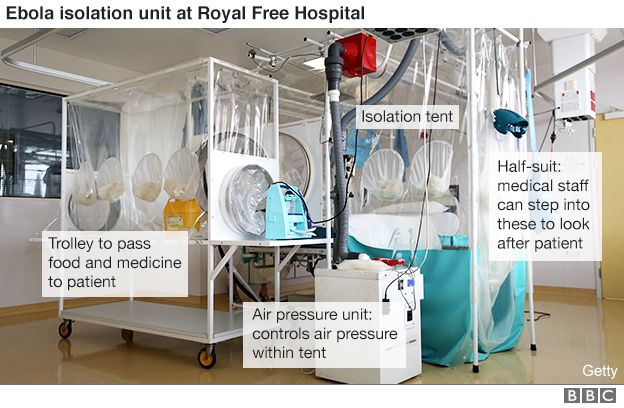The BBC's Nick Quraishi says the patient was whisked past reporters in an RAF ambulance
A health worker who was diagnosed with Ebola after returning to Scotland from Sierra Leone has arrived at a specialist treatment centre in London.
The woman, who travelled to Glasgow via Casablanca and London Heathrow, was taken to the Royal Free Hospital.
She is understood to have been flown to RAF Northolt in a military plane after leaving Glasgow in a convoy.
Passengers on flights she took to the UK are being traced, but officials say the risk to the public is very low.
The woman left Gartnavel Hospital in Glasgow just after 03:00 GMT on Tuesday.
Six police cars accompanied two ambulances as she was taken to Glasgow Airport. She has been taken to an isolation unit at the north London hospital from the RAF base in west London.
 The female patient left hospital in Glasgow in the early hours of Tuesday
The female patient left hospital in Glasgow in the early hours of Tuesday
 The woman arrived at the Royal Free Hospital in north London just before 08:00 GMT
The woman arrived at the Royal Free Hospital in north London just before 08:00 GMT
UK Health Secretary Jeremy Hunt said NHS safety measures in place were working well.
Mr Hunt, who chaired an emergency Cobra meeting on Monday evening, said the government was doing "absolutely everything it needs to" to keep the public safe.
"We are also reviewing our procedures and protocols for all the other NHS workers who are working at the moment in Sierra Leone," he added.
The patient, who had been working with Save the Children in Sierra Leone, arrived in Glasgow on a British Airways flight on Sunday but was placed in an isolation unit at Gartnavel Hospital on Monday morning after becoming feverish.
Dr Stephen Mepham explains how the isolation unit works
Under UK and Scottish protocol, she was moved to the high-level isolation unit at the Royal Free Hospital.
UK nurse William Pooley - who contracted Ebola in Sierra Leone earlier this year - was successfully treated at the same facility.
Scottish First Minister Nicola Sturgeon, who chaired a meeting of the Scottish Government Resilience Committee on Monday, said the risk to the public was "extremely low to the point of negligible".
She added the patient was thought to have had direct contact with only one other person between arriving in Glasgow and attending hospital on Monday.
But Ms Sturgeon said there was only a "low probability" the woman also had the disease as she has not had direct contact with anyone infected with Ebola.
Analysis: BBC health editor Hugh Pym
This latest incident will raise questions about the screening process in place for passengers leaving West Africa and arriving at Heathrow.
Public health officials say the woman was taken aside on arrival in the UK and her temperature was taken - the procedure followed for all incoming health staff who say they have been in contact with Ebola patients.
Her temperature was found to be normal and she was not feeling unwell, so she continued her journey to Glasgow.
Someone with Ebola only becomes infectious once they develop symptoms. In this case, that only became apparent after she arrived in Scotland.
The task of contacting the passengers and crew on the flights she took is now under way. That will be complicated, but officials are insisting the risk to those people is extremely low.
Efforts are being made to trace the 71 other passengers who travelled on the same flight from London to Glasgow.
A British Airways spokesman said: "The safety and security of our customers and crew is always our top priority and the risk to people on board that individual flight is extremely low."
A telephone helpline has been set up for anyone who was on the BA 1478 flight which left Heathrow Airport on Sunday evening. The number is 08000 858531.
Continue reading the main story
Glasgow Ebola case
Patient flight details - 28 December
Reuters
Tom Solomon, director of Liverpool's Institute of Infection and Global Health, said of the reaction to the woman's diagnosis: "We've had training exercises up and down the country and that's why you've seen that the response has been very calm and very controlled.
"It's very important that despite this case we have healthcare workers continue to go out to west Africa to help bring this disease under control."
Paul Cosford, medical director for Public Health England described the woman as a "very brave person", telling BBC Breakfast she had "put herself in the front line of care for people with Ebola".
He also said that about 150 people in the UK had been tested for Ebola recently - with all except Mr Pooley and the female patient being taken from Glasgow returning a negative result.
 The patient had travelled from Freetown in Sierra Leone via Casablanca
The patient had travelled from Freetown in Sierra Leone via Casablanca
Professor Dame Sally Davies, Chief Medical Officer for England, said: "We have robust, well-developed and well-tested NHS systems for managing unusual infectious diseases when they arise, supported by a wide range of experts.
"The UK system was prepared, and reacted as planned, when this case of Ebola was identified."
Ebola is transmitted by direct contact with the bodily fluids - such as blood, vomit or faeces - of an infected person.
The virus has killed more than 7,800 people, mostly in West Africa, since it broke out a year ago.
The World Health Organization says the number of people infected by the disease in Sierra Leone, Liberia and Guinea has now passed 20,000.
What are the symptoms?
 The Ebola virus causes a range of painful and debilitating symptoms
The Ebola virus causes a range of painful and debilitating symptoms
The early symptoms are a sudden fever, muscle pain, fatigue, headache and sore throat.
This is followed by vomiting, diarrhoea, a rash and bleeding - both internal and external - which can be seen in the gums, eyes, nose and in the stools.
Patients tend to die from dehydration and multiple organ failure.







 One month on
One month on Farmers abandon fields
Farmers abandon fields


